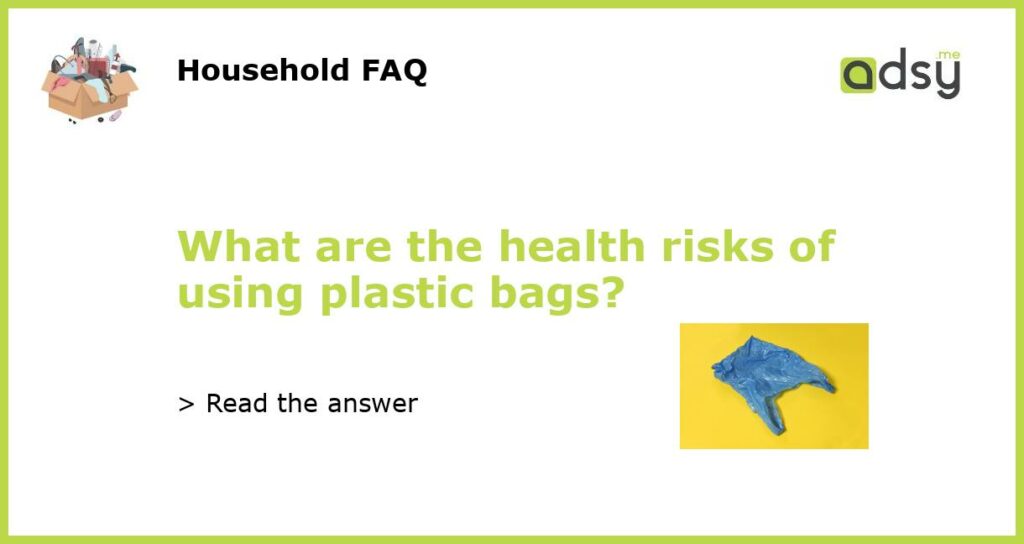Plastic Bags and the Environment
Plastic bags have become a staple in our daily lives, and it’s hard to imagine a world without them. However, their convenience comes at a high cost to the environment. Plastic bags are made from non-renewable resources, primarily fossil fuels, which contribute to climate change and pollution. Additionally, the production and disposal of plastic bags have severe environmental consequences.
When plastic bags end up in landfills, they can take hundreds of years to decompose. As they break down, they release harmful chemicals and microplastics into the soil and water, contaminating ecosystems and posing a threat to wildlife. These microplastics can be ingested by animals, leading to harmful health effects for both marine and terrestrial species.
Health Risks for Humans
While the impact of plastic bags on the environment is widely recognized, the potential health risks for humans are often overlooked. Plastic bags contain toxic chemicals, such as phthalates and bisphenol A (BPA), which have been linked to various health issues.
Exposure to phthalates, commonly used as plasticizers in vinyl products, including plastic bags, has been associated with hormone disruption, reproductive problems, and developmental issues in children. Studies have found a correlation between higher levels of phthalates in the body and an increased risk of asthma, allergies, and other respiratory conditions.
Bisphenol A (BPA), another chemical found in plastic bags, has been shown to mimic hormones in the body and disrupt the endocrine system. It has been linked to fertility problems, obesity, and an increased risk of certain cancers. Studies have also raised concerns about BPA’s potential impact on brain development, particularly in young children.
Direct and Indirect Exposure
Plastic bags pose a risk of direct exposure to these toxic chemicals through physical contact. When we handle plastic bags, especially if they contain hot or acidic food, the chemicals can leach into our skin and be absorbed into our bodies. Ingestion of plastic bag fragments or microplastics can also occur if they contaminate food or beverages.
Indirect exposure to plastic bag chemicals can happen through environmental contamination. As plastic bags break down, they release particles and chemicals into the air and water, which can be inhaled or ingested. These microplastics can accumulate in our bodies over time and have long-term health implications.
Vulnerable Populations
Some populations may be more vulnerable to the health risks associated with plastic bags. Pregnant women, children, and individuals with compromised immune systems are particularly at risk. The developing fetus can be exposed to harmful chemicals through the placenta, potentially impacting growth and development. Children, who tend to put objects in their mouths, may have greater exposure to microplastics and chemical contaminants.
Individuals with weakened immune systems, such as those undergoing chemotherapy or organ transplants, may be more susceptible to the toxic effects of plastic bag chemicals. These individuals are less able to detoxify and eliminate harmful substances from their bodies, making them more susceptible to the adverse health effects of plastic bags.
Safer Alternatives and Solutions
To reduce the health risks associated with plastic bags, it is essential to adopt safer alternatives and promote sustainable solutions. Reusable bags made from natural materials such as cotton or hemp are a viable alternative to single-use plastic bags. These bags can be washed and reused multiple times, reducing the need for disposable options.
Some stores and communities have implemented plastic bag bans or fees, encouraging shoppers to bring their own bags. These initiatives help reduce the demand for plastic bags and promote a more sustainable approach to shopping.
Recycling programs for plastic bags can also help mitigate the environmental and health risks. Proper recycling ensures that plastic bags are diverted from landfills and incinerators, reducing their impact on the environment and minimizing the potential for human exposure to toxic chemicals.
By raising awareness about the health risks of plastic bags and adopting alternative solutions, we can protect both our environment and our well-being. Small changes, like choosing reusable bags and supporting plastic bag reduction initiatives, can make a significant difference in preserving our health and the planet.






